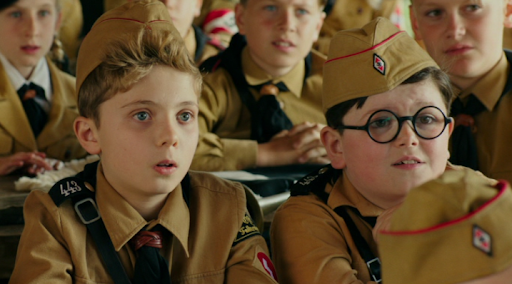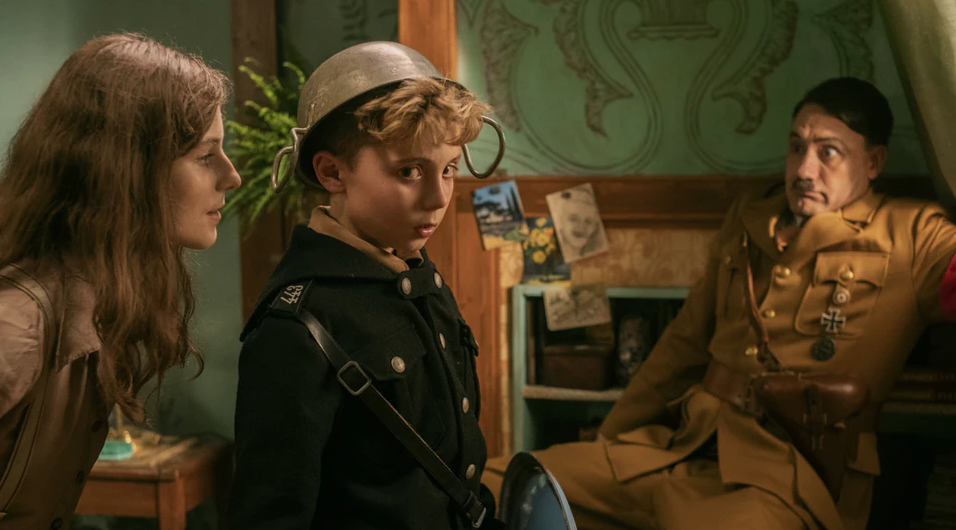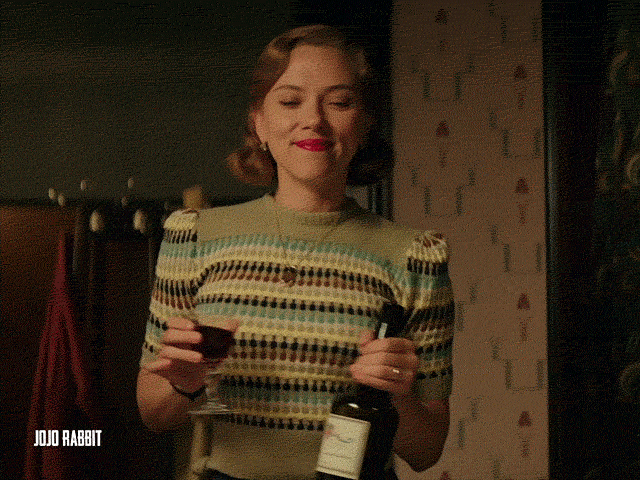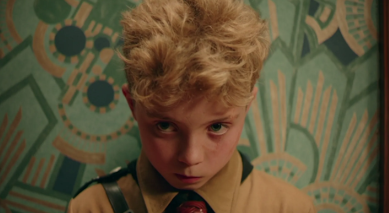Please welcome guest contributor Rita Maricone-Dorsch...

Last night, I sat down to revisit Jojo Rabbit, this time with my son, who is equal parts World War II aficionado, Marvel fanboy, and already-pretty-woke tween. Taika Watiti's self-labeled 'anti-hate satire' seemed custom made for his sensibilities. But why do you like this movie so much, he asked me.
I've been wrestling with this question since the film's release, and since my own impression of it differed so drastically from most reviews, including the positive takes. I didn't see a too-tame provocation that poked easy fun at Nazis. I didn't see a project intended to humanize bigoted white men. I'm not sure it's even best described as an anti-hate satire. To me, Jojo Rabbit was a sweet little allegory about a dangerously underrepresented and urgent subject: the emotional education of boys...
The same could be said of Watiti's previous work, but the topic merits revisiting, and as much as I enjoy Boy and Hunt for the Wilderpeople, this is his most successful stab at the theme. Germany in the waning days of the war is merely a puppet theater for Watiti to play out his thesis. Imaginary Hitler is simply the embodiment of all the overly-simple and ultimately harmful ideas we give boys about their masculinity and value, made appropriately ridiculous by Watiti's performance.
In the opening monologue, as he arms himself for Hitler Youth camp, ten-year-old Jojo says, "it's going to be intense, but today you become a man". Imaginary Hitler, we can gather from their familiar way with each other, has been feeding him toxic ideas for some time now. According to this Hitler, Jojo must aspire to be a snake, a wolf, a panther...in other words, an animal instead of a human. He uses Jojo's insecurities against him when the boy expresses doubt. A boy doubts. A man must be certain.
This is only further reinforced when Jojo gets to camp and Sam Rockwell's Captain K instructs his recruits that the first step toward being men is 'marching' and 'firing guns' among other activities of questionable purpose and safety. The older boys don't mince words. Being a man means killing. Jojo does his best to steady his voice as he claims to love killing, too, but he can't make good on his bluff. Hitler-as-alter-ego possesses him to recklessly make off with a grenade, to demonstrate his toughness. Jojo literally blows himself up with toxic masculinity.
Enter the women: Scarlett Johansson as his now single mother, Rosie, and Thomasin McKenzie as Elsa the Jewish teen she's been hiding behind her dead daughter's bedroom walls. In contrast to the Looney Tunes acting that most of the male cast turns in (and I mean that as high praise; it's effective and what the movie calls for), Johansson and McKensie give heartbreakingly lived-in performances that build the moral center and contextualize the parody. It's their job to counterprogram Jojo.

Elsa could've been a sympathetic nothing, but McKenzie's performance and Watiti's dialogue render her as a whole and fully realized teenage person who just happens to be hiding out during the Holocaust. She's as miffed about the possibility of capture as she is about a possibly unfaithful boyfriend, which - if you've ever read The Diary of Anne Frank - checks out. She doesn't sway the wayward Jojo with kindness and patience, either. She's bold and crass, and takes pleasure in screwing with him. Theirs isn't an idyllic relationship. It's just a relationship. That she's the more self-possessed of the two is so neatly and hilariously represented by the fact that she ends up with two knives to Jojo's zero, his prized Hitler Youth issue dagger included. That Imaginary Hitler is so threatened by her is really all you need to know about this movie.
But I think I love JoJo Rabbit because of Rosie and what she represents. I found myself relating - so hard - to the story through Johansson's career-best work. Twice, Rosie tells Jojo that people have done 'what they could'. Rosie is stay-at-home mom Schindler, able to laugh off her son's fanaticism and send him off to hate camp as she risks her own life, not because she's complicit but because she's doing her best with the chess moves that are left available to her.
And this is where I think I diverge from the hive mind.

Jojo Rabbit is the rare story with obvious liberal messaging, to which coastal liberals might have a real blind spot. I live in the rural Midwest. I've microwaved chicken nuggets for kids who've said and maybe believed awful things. I've chatted up their regressive parents in my kitchen. But those are the kids my kids have to play with, and those are the parents I have to talk to, for whatever reason. Usually sports. I've not lost a child and a spouse to war, but I have tried by best to teach my son about goodness and healthy masculinity - in fits and spurts, and often with laughs - even as I know he's getting pretty opposite notions from much of the rest of the world as it is. I don't even think some of those regressive people are awful. Sometimes they just haven't had access to counterprograming. They think about others the same way Jojo thinks about Jews - with fear masked as hate - until he gets to know Elsa. I'm my son's Rosie and I'm their Elsa.
It's important that Jojo takes place in the final desperate days of Nazi Germany, when people are at their most violently irrational and unpredictable. That's when the movie imparts its true wisdom. Not that Hitler was stupid; that's neither very funny nor insightful. Even the most conservative not-quite-white-supremacists probably go into Jojo Rabbit agreeing that Hitler=bad. Not that hate and xenophobia are wrong. Perfect coastal liberals should already know that; the movie assumes as much and quickly moves on to more compelling ideas.
The symbolism is all there for the considering. Child soldier Yorki tells Jojo that the Nazis have outfitted him with a 'paper-like uniform'. Captain K rips off Jojo's military jacket to spare his life. Imaginary Hitler visits him one last time, bleeding from a self-inflicted gunshot wound. Jojo finally learns how to tie a shoe...that confounding skill that, once learned, becomes second nature. Elsa gives a reformed JoJo back his knife as she reminds him he's a boy. Not just a boy, but a boy, as if that's a perfectly fine thing to be. In the end, he tells himself that he's, "Jojo Betzler, ten and half years old, today, just do what you can", with no mention of being a man, having learned his mother's parting lesson.
It's hard for people (here meaning perhaps boys, perhaps bigots) to entertain new ideas, to admit we're wrong...and it's relationships, not rhetoric that make us feel safe enough to become as vulnerable as that requires. The true lesson of JoJo Rabbit is that emotional maturity is being able to change the mind without losing the self. No feeling is final, Watiti quotes Rilke in the credits. If only we could raise the next generation of leaders, and voters, to think so.

Though I see JoJo as an allegory, I do think it's notable that it also works as a cautionary piece of historical fiction. Children really were brainwashed and weaponized. Objectors really were hung in the streets. I especially appreciated the inclusion of the tension between Captain K and Finkel. They would've been killed for being homosexual, but facing death anyway, they go out in a blaze of helmet plumage, eyeliner, and pop music. It could happen again, ridiculous as it may seem. The emotional miseducation of boys comes back to bite us all.
I've got my work cut out for me. My kid's liked it as much as I imagined he would, but his favorite part was when Jojo screamed, "Fuck you, Hitler".